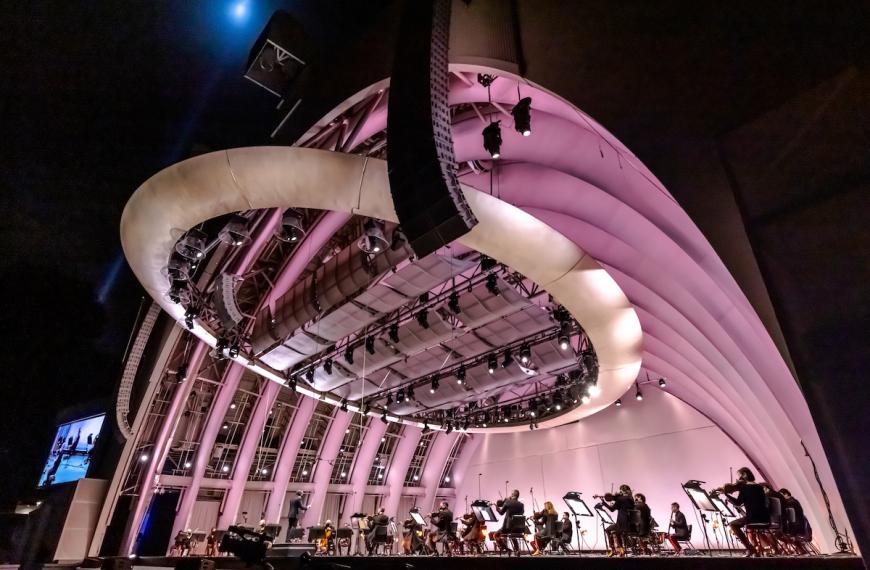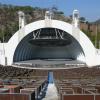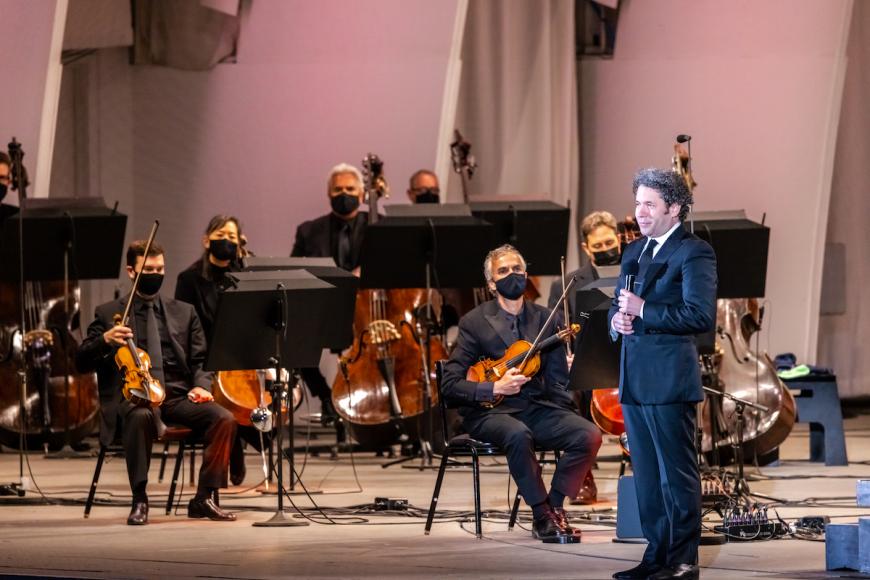
We’re not there yet. But on Saturday the light at the end of the tunnel got a lot closer as the Los Angeles Philharmonic performed a concert — the first of four free events — for 4,000 frontline and essential workers at the Hollywood Bowl. Conducted by Gustavo Dudamel, it was a gathering of joy and somber remembrance that would have seemed impossible just a few months ago. When it ended, Dudamel turned to the crowd with his signature radiant smile and proclaimed, “This is magic!”
Eighteen months had passed since an audience of any size had attended a concert at the Bowl because the pandemic forced the cancellation of the 2020 summer season — the first such closure in the Bowl’s 98-years of operation. The result was a disastrous loss of revenue for the Philharmonic. And had it happened for a second time, it very likely would have bankrupted the orchestra. But now, with restrictions lifting, the Philharmonic is looking forward to an almost full season of concerts at the Bowl, beginning with a Fourth of July blowout. Saturday’s event was a lead up, the first of three, free, limited seating performances for essential workers.
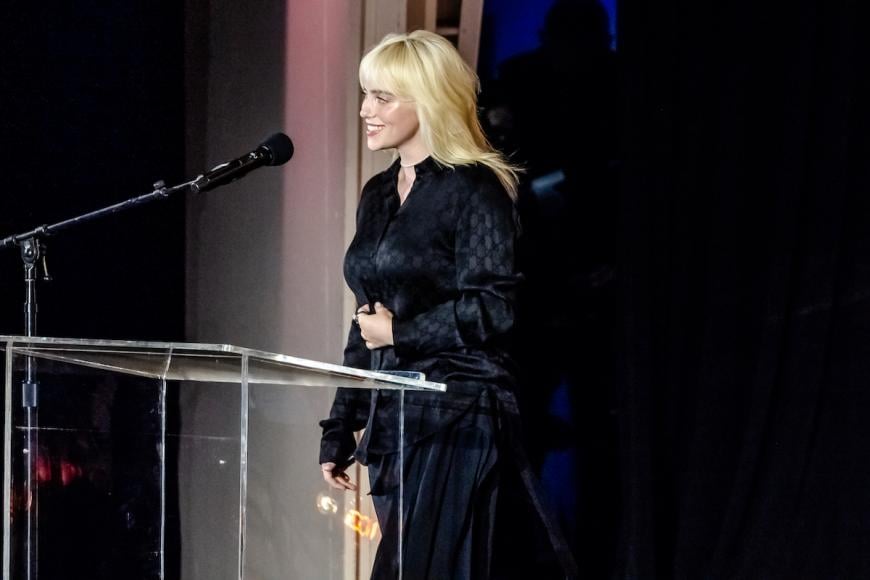
It began with a surprise appearance by pop-singer, Billie Eilish, who related a fond memory of performing on the Bowl stage for the first time as a girl.
“Welcome back to the Hollywood Bowl, baby!” she proclaimed. Then she introduced Gustavo Dudamel and the orchestra which produced the first audience ovation to echo in the Cahuenga Pass in a year and a half.
Clearly it was an emotional moment for Gustavo Dudamel.
“Tonight,” he said, “we honor you with the greatest gift we have, our music. For us, this is a resurrection. It has been a very complex year, but we are here. We are here because of you, because of your generosity and your courage. For all the beautiful souls that lost the battle, but are here with us [in spirit], we want to dedicate the Barber Adagio for Strings.
What followed was — despite the extreme social distancing and masking enforced on the musicians, as well as the decidedly chilly night air — a performance of profound significance that ended with an unforgettable moment.
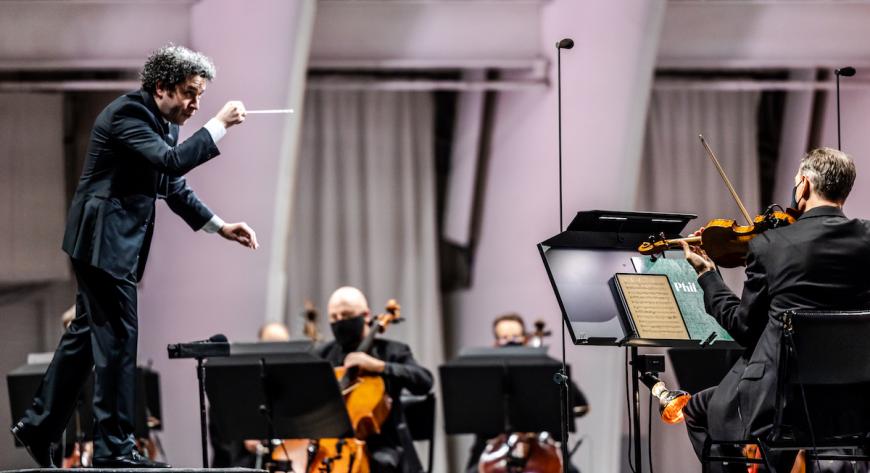
As the final diminuendo began to fade to a whisper and then to silence, a closeup of Dudamel appeared on the large screens that flank the Bowl. His eyes seemed to be closed and his palms were raised toward the musicians, almost in a gesture of supplication. As the entire Bowl remained hushed, he very gradually brought his fingers together in a prayer. It was remarkable.
He then turned to the audience to introduced the next piece.
“Tonight we are celebrating,” he declared. “It is a day to be uber-happy! We have been doing some recording on this stage, but it is not the same without an audience — the interaction of energy between what happens on the stage and what you give us. Today is about heroism and we want to celebrate that with a symphony that is called “Eroica,” the “Heroic Symphony” by Beethoven. It represents everything — struggle and victory, sadness and happiness, all of what is life.”
Without question the devastation of the pandemic added a significant layer of context to the symphony, particularly the second movement, the funeral march. It’s impossible to imagine the emotions and memories this music must have evoked for this audience. And even under the difficult conditions imposed on the musicians, Dudamel crafted a performance that forged a deeply felt bond of heartfelt compassion.
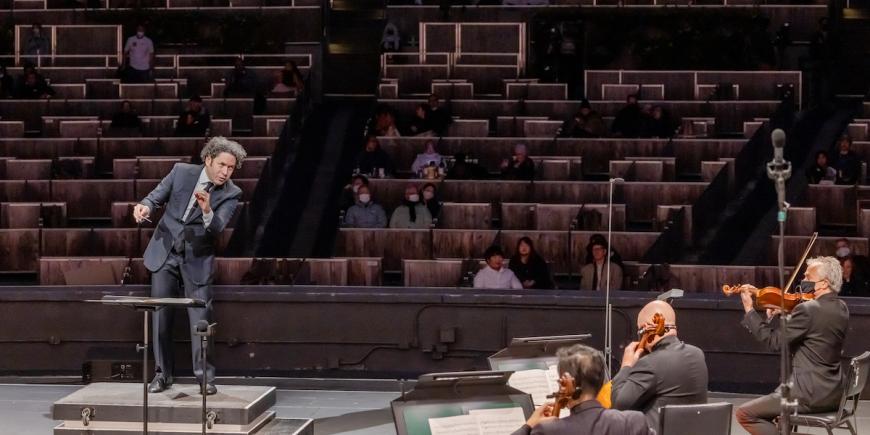
Since the concert was to be performed without an intermission, it opened with a little wisp of a piece for strings, Starburst, by Jessie Montgomery. The effect was a lot like the fireworks so associated with the Bowl, shooting into the air, bursting in a glimmer and gone. Since the decision was made not to perform the National Anthem (because of health restrictions on singing) a perfect alternative would have been Montgomery’s powerful work, Banner, with its evocative exploration of musical Americana, a work the orchestra recorded as part of its Sound Stage series.
The concert ended with a little bookend encore as Dudamel led the orchestra in the “Waltz” from Leonard Bernstein’s Divertimento.
“This is magic” the conductor exclaimed. “Thank you. Thank you. Thank you. Muchas gracias!”
